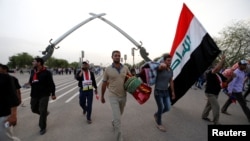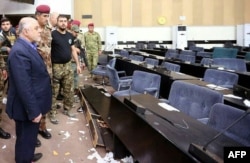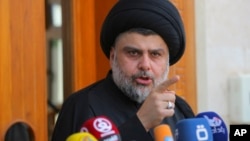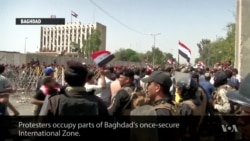Tens of thousands of pilgrims gathered at a north Baghdad shrine Tuesday for a Shi'ite religious festival commemorating 8th century Imam Moussa al-Khadhim, despite the threat of an attack following two jihadist bombings this week.
Protesters who stormed into the International Zone on Saturday largely toned down their demonstration and drifted out to celebrate on Monday. Despite increased security measures, including blocking all major roads, to protect the pilgrims, Sunni extremists have still managed to launch attacks, including a car bomb Monday which killed 18 pilgrims.
Protest leader Moqtada al-Sadr vowed he would return to the area, home of the nation's parliament and various foreign embassies and international organizations, this Friday to pressure the government to change or call snap elections.
Most of the country's lawmakers fled the area over the weekend when Sadr’s followers charged into parliament, demanding a new government.
It is not clear if and when they intend to return. Lawmaker Serwan Sereni told VOA that an emergency meeting between Iraqi President Fuad Masum, Prime Minister Haider al Abadi and militia leaders failed to reach agreement on a way forward.
The leader of the Sadr bloc in parliament Dhiaa al-Assadi confirmed to VOA that political meetings held Monday between the president and the prime minister and different political parties about a solution to the current problem had not produced any solutions. But he brushed off any suggestion that the political crisis was affecting the fight against Islamic state.
"There are so many brigades and divisions fighting against Islamic State, including Sadr brigades, still in their positions, and other militias under control of other parties also fighting," Assadi said. "We can differentiate between the political process in Baghdad and the fight against Daesh (Islamic State)."
Cronies versus technocrats
Sadr, a powerful Shi'ite nationalist cleric who made his name by fighting U.S. forces in Iraq, has a strong following in the country, capitalizing on deep public frustration with government corruption, political patronage and inefficiency.
The protest was the first to seriously breach the International Zone security cordon, yet was bloodless, which "suggests that the security forces in the targeted area were sympathetic, or were ordered to stand down; likely both are true," notes the Soufan Group, which provides security and risk management analyses.
Even if there was no serious violence, Sereni, a member of the Kurdish Democratic Party in Iraq's parliament, said considerable damage had been done to the political process.
"We are totally against what happened in Baghdad. We will not allow anyone to humiliate our members, or decide on our behalf. We have our rights in Baghdad," he told VOA. "Sadr's party only has 34 seats (in parliament) and they want to dictate... the new Cabinet."
Sadr has demanded that a government of technocrats replace the current leadership, but, entrenched political parties rejected Prime Minister Abadi's attempts to replace their ministers.
Time to go separate ways?
For Sereni, the upheaval is the culmination of what has long been a dysfunctional political process.
"We Kurds have tried since 2003 to play a positive role in the new, democratic system of Iraq; but none of the governments has protected our rights. I think it is time for the Kurds to go forward with their independence, and the Sunnis should do the same. They should try to think of a separate region," Sereni said.
"It is time for America, the British and the United Nations to implement the proposal put forward by [U.S. Vice President Joe] Biden. It is time to make three regions in Iraq," he said.
Biden in 2006 advocated creating three autonomous regions within Iraq for the Kurdish, Sunni and Shi'ite populations, with a central government in Baghdad.
While Sadr's protest by Monday had quieted down, the day-to-day violence continued in the capital, with a car bomb exploding in Saydiyah, a district in southern Baghdad.
According to the United Nations, 410 civilians were killed and 973 injured in various acts of terrorism, violence and armed conflict around the country last month; 232 of those were killed in Baghdad.
"It pains us to see the continuing bloodletting and loss of life, particularly among civilians who are paying a high price as a result of bombings and armed clashes," U.N. Special Envoy to Iraq Jan Kubis said in a statement.
Watch video of Saturday protests:









